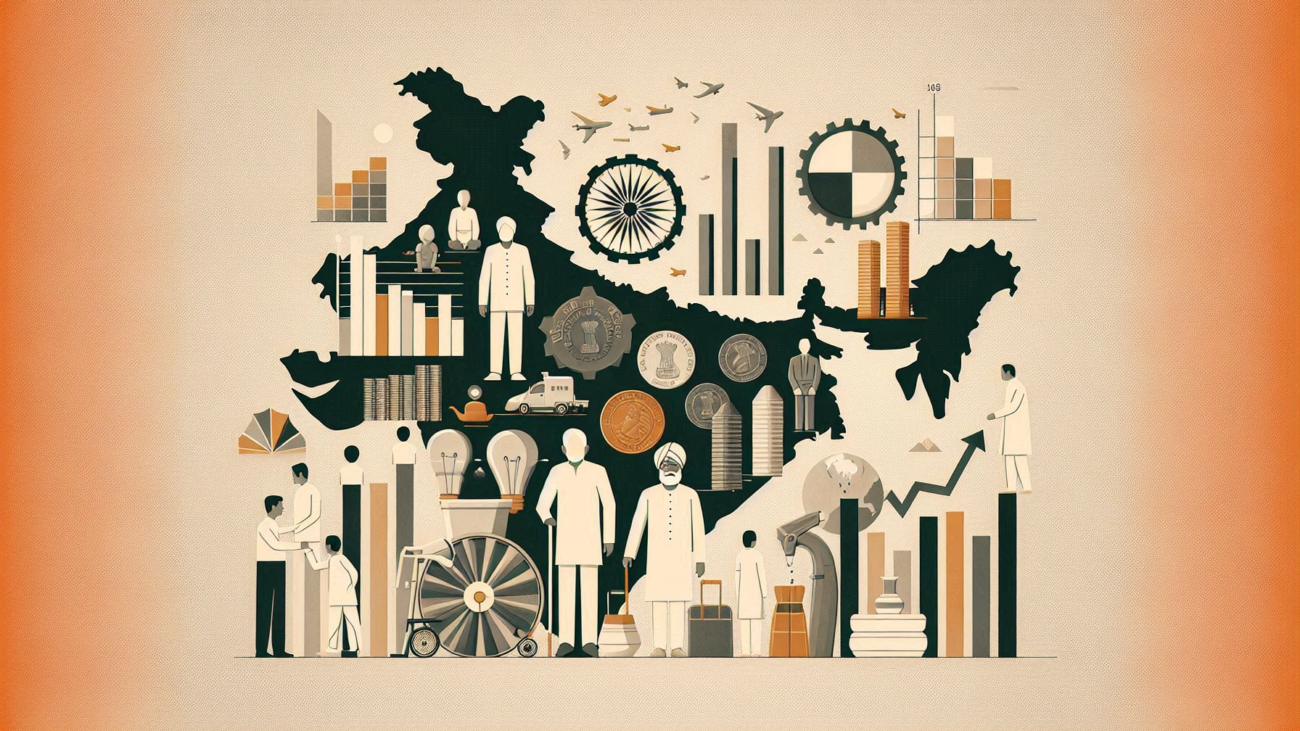India’s economic development is at a critical inflection point as it strives to balance traditional growth sectors with the burgeoning opportunities presented by smart cities, 21st-century education, advanced employment strategies, and cutting-edge technologies such as automation, AI, and robotics. To stay competitive in the global economic landscape, India must adopt comprehensive policies and initiatives that cater to these evolving demands.
Smart Cities: Building the Urban Future
The Concept of Smart Cities: Smart cities utilize technology to enhance the quality of life, optimize resource use, and ensure sustainable development. The Indian government’s Smart Cities Mission aims to transform urban areas by integrating infrastructure, technology, and governance.
Key Areas of Development:
- Digital Infrastructure: Implementing robust digital infrastructure, including high-speed internet and IoT networks, to support smart city applications.
- Sustainable Energy: Promoting renewable energy sources, such as solar and wind, and developing smart grids for efficient energy management.
- Efficient Transportation: Enhancing public transportation with smart systems for traffic management, real-time updates, and efficient route planning.
- Waste Management: Utilizing smart waste management solutions to ensure recycling, waste reduction, and environmental sustainability.
- Public Services: Digitalizing public services to provide seamless access to healthcare, education, and administrative functions.
Challenges and Solutions:
- Funding and Investment: Securing adequate funding through public-private partnerships and foreign investments.
- Integration: Ensuring interoperability between various smart systems and legacy infrastructure.
- Citizen Engagement: Involving citizens in the planning and implementation processes to ensure that smart city solutions meet their needs.
21st Century Education: Preparing for the Future
Educational Transformation: As the job market evolves, so must the education system. Preparing students for 21st-century jobs requires a focus on critical thinking, creativity, collaboration, and technological literacy.
Key Initiatives:
- Curriculum Modernization: Updating curricula to include STEM (Science, Technology, Engineering, and Mathematics) education, coding, and digital literacy.
- Teacher Training: Providing continuous professional development for teachers to adopt innovative teaching methods and technology integration.
- Digital Learning Platforms: Leveraging online education platforms to provide flexible and personalized learning experiences.
- Industry Collaboration: Partnering with industries to offer practical training, internships, and exposure to real-world applications of classroom learning.
- Inclusive Education: Ensuring that all students, including those from marginalized communities, have access to quality education and digital tools.
Challenges and Solutions:
- Infrastructure: Building and maintaining digital infrastructure, especially in rural areas.
- Equity: Addressing disparities in access to technology and quality education.
- Adaptation: Encouraging educational institutions and educators to embrace change and innovation.
Employment and Opportunities: Creating a Dynamic Workforce
Employment Strategies: A dynamic and resilient workforce is essential for economic growth. India needs to create diverse job opportunities and ensure that its workforce is equipped with relevant skills.
Key Focus Areas:
- Skill Development: Expanding vocational training and skill development programs aligned with industry needs.
- Entrepreneurship: Encouraging entrepreneurship through startup incubators, financial support, and mentorship programs.
- Gig Economy: Embracing the gig economy to provide flexible work opportunities and leverage digital platforms.
- Public Sector Jobs: Reforming public sector recruitment and training processes to improve efficiency and innovation.
- Rural Employment: Developing rural industries and agricultural innovations to create job opportunities outside urban areas.
Challenges and Solutions:
- Job Mismatch: Addressing the mismatch between available jobs and the skills of job seekers through targeted training.
- Economic Stability: Ensuring stable economic policies that foster job creation and business growth.
- Technology Adoption: Encouraging businesses to adopt new technologies and create tech-centric job roles.
Automation, AI, and Robotics: Leading the Technological Revolution
Technological Integration: Automation, artificial intelligence (AI), and robotics are transforming industries and redefining job roles. Embracing these technologies can enhance productivity and global competitiveness.
Key Strategies:
- Research and Development: Investing in R&D to foster innovation in AI and robotics.
- Industry 4.0: Promoting the adoption of Industry 4.0 practices in manufacturing and other sectors to enhance efficiency and production.
- Education and Training: Integrating AI and robotics into educational curricula and providing specialized training programs.
- Startups and Innovation Hubs: Supporting tech startups and creating innovation hubs to drive technological advancements.
- Regulation and Ethics: Developing regulatory frameworks that ensure the ethical use of AI and automation technologies.
Challenges and Solutions:
- Displacement: Mitigating job displacement caused by automation through reskilling and upskilling programs.
- Infrastructure: Building the necessary digital and physical infrastructure to support advanced technologies.
- Ethical Concerns: Addressing ethical issues related to AI and ensuring transparency and accountability in their deployment.
Maintaining Global Competitiveness
Economic Policies: To remain competitive, India must implement economic policies that promote innovation, sustainability, and inclusivity.
Key Measures:
- Trade Policies: Developing trade policies that encourage exports and attract foreign investment.
- Regulatory Reforms: Simplifying regulations to make it easier to do business in India.
- Innovation Ecosystem: Creating an ecosystem that supports innovation through grants, tax incentives, and infrastructure.
- Sustainable Practices: Promoting sustainable business practices to meet global standards and address environmental concerns.
- Inclusive Growth: Ensuring that economic growth benefits all sections of society, reducing income inequality and poverty.
Challenges and Solutions:
- Policy Implementation: Ensuring effective implementation of policies through robust governance and accountability mechanisms.
- Global Trends: Staying abreast of global economic trends and adapting policies to remain competitive.
- Collaboration: Encouraging collaboration between the government, private sector, and civil society to achieve common economic goals.
Conclusion
India’s path to enhanced economic development involves a multi-faceted approach that addresses smart city development, 21st-century education, dynamic employment strategies, and the adoption of advanced technologies like automation, AI, and robotics. By implementing forward-thinking policies and fostering a culture of innovation and inclusivity, India can position itself as a global economic powerhouse, ensuring a prosperous future for all its citizens.

